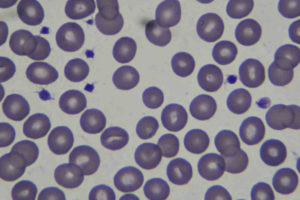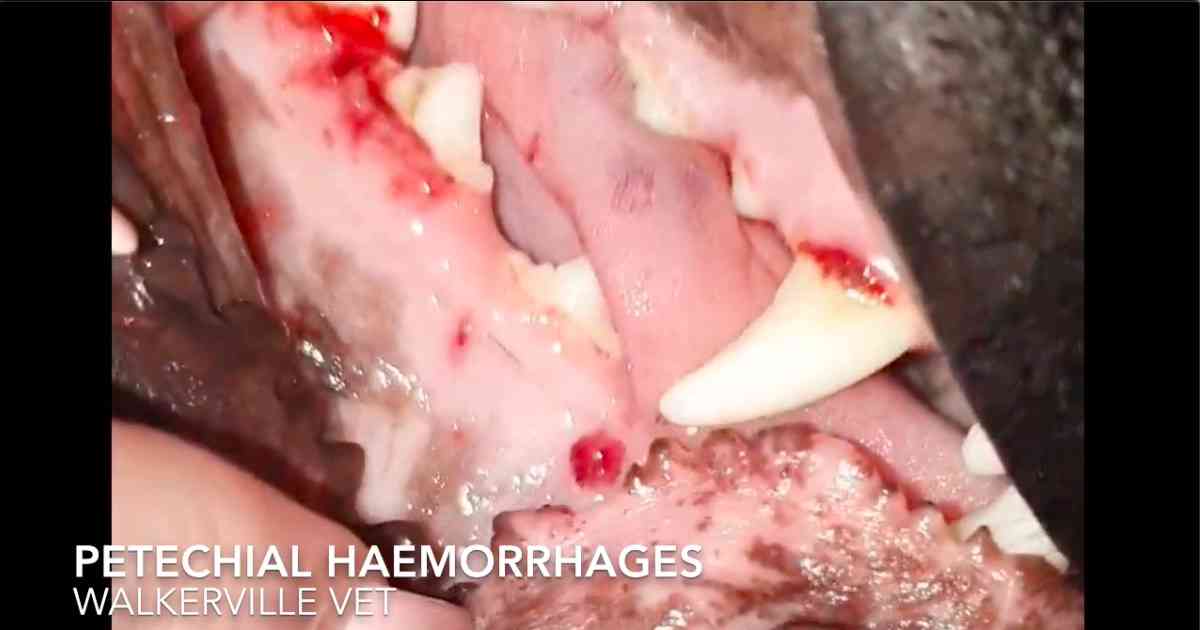Updated January 28, 2021

The most common bleeding disorder in dogs after rodenticide poisoning is a low platelet count.
Platelets are the small darkly stained blobs in this blood smear (the larger ones are red blood cells). They don’t look like much but they perform an essential function.
The purpose of platelets is to form a clot and stop bleeding. It might surprise you that our vessels aren’t all that strong, and leaks are springing up all the time. Of course you don’t normally know this, because platelets are there to form a handy plug with seconds.
Until they’re not. Unlike bleeding from rat bait, which is usually internal and hard to spot, bleeding from low platelets has a characteristic pattern.
Signs Of Platelet Deficiency
A dog with insufficient platelets will have one or all of the following:
- Bruises on the skin and gums
- Swellings caused by blood under the skin
- Bleeding from the nose or any other orifices
- Blood in the stool or urine
- Blood in the eye
- Pale gums, lethargy and fast breathing from blood loss
The video shows one typical appearance of such a dog with thrombocytopenia, or low platelets. The patchy areas of bruising you can see on the gums and tongue are called petechiae (peh-teek-ee-eye). These are where a small vessel has ruptured and bled for far too long. The gumline is also bleeding, probably from damage during chewing that would normally have healed.
Diagnosis is straightforward. Any routine blood test includes a platelet count. Normal levels are around 300,000/µL but dogs commonly won’t bleed until they get down to 30,000/µL.
Causes Of Thrombocytopenia In Dogs
It was once believed that most dogs with a low platelet count have an auto-immune disease called immune-mediated thrombocytopenia, or IMT. We now understand that 85-90% of cases actually have an underlying cause. These include:
- Infectious causes
- Tumours, especially of the spleen
- Drugs
Infections are the most common, and can be quite hard to diagnose. They are unusual bacteria, often blood-borne, and spread by ticks, fleas or mosquitos. The list includes Ehrlichia, Babesia, Haemobartonella, Rickettsia, Leishmania, Borrelia and Dirofilaria.
Diagnosis of these infections is via direct examination of a blood smear or a laboratory-based tick vector PCR panel.
Treatment Of Thrombocytopenia
Dogs with low platelet counts often present to the vet with life-threatening bleeding. Therefore, it can be a challenge to work out the cause in time. For this reason, the first treatment is often a blood transfusion.
Blood transfusions in dogs are quite straightforward, because they rarely carry antibodies to other blood types. Therefore, most dogs will happily tolerate a single unmatched transfusion. After this, blood typing is essential, even though it’s always a good idea when available.
The time pressure also means there’s nothing wrong with starting immunosuppressive drugs straight away, as long as the likelihood of an underlying problem isn’t ignored. Dogs are most commonly treated with a combination of:
- Prednisolone or prednisone (a corticosteroid)
- Azathioprine (an immunosuppressant)
- A single vincristine injection
- Gastric ulcer protectants
Even if there’s an undiagnosed infection, these drugs will often temporarily normalise the platelet count. However, taking an immunosuppressive is the last thing the body needs if an infection exists. Therefore, it’s sensible to add an antibiotic like doxycycline whether or not there is evidence.
It’s also a good idea to keep your dog very quiet until the platelet count rebounds, to avoid further bleeding. This typically takes 2 to 7 days.
Most dogs respond well to treatment, though it is important to say that not all dogs survive. With frequent monitoring, it’s usually possible to slowly reduce the drug doses over time until they are either at well-tolerated low doses, or stopped altogether.
Have something to add? Comments (if open) will appear within 24 hours.
By Andrew Spanner BVSc(Hons) MVetStud, a vet in Adelaide, Australia. Meet his team here. The information provided here is not intended to be used as a substitute for going to the vet. If your pet is unwell, please seek veterinary attention.

